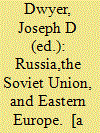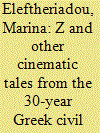| Srl | Item |
| 1 |
ID:
120900


|
|
|
|
|
| Publication |
2013.
|
| Summary/Abstract |
Greece's relationship with the Soviet Union was burdened by the Greek civil war, which was closely related to the outbreak of the Cold War in the Near East in 1946-47. The collapse of Greece's parliamentary regime in 1967 arrested a process toward détente undergone by practically every member state of the North Atlantic Treaty Organization in the 1960s. The new impetus in Greek- Soviet relations in the late 1970s, after the restoration of democracy in 1974, did not signify the loosening of Greek loyalty to the West but was a pragmatic pursuit of interests between two asymmetrical powers.
|
|
|
|
|
|
|
|
|
|
|
|
|
|
|
|
| 2 |
ID:
168621


|
|
|
|
|
| Summary/Abstract |
John N. Gentry argues that Violent Non-State Actors, such as insurgencies or terrorist groups, use intelligence in three ways. First and foremost, they employ intelligence to plan physical military attacks and to protect themselves from penetration and attack by government forces. Secondly, they use counterintelligence in order to ensure the survival of the insurgency and preserve the faith of their members by enforcing ideological discipline. Finally, they use information operations to shape their operational environments. This article seeks to determine what type of intelligence the Greek insurgents employed during the civil war and whether this insurgency fits Gentry’s model.
|
|
|
|
|
|
|
|
|
|
|
|
|
|
|
|
| 3 |
ID:
146230


|
|
|
|
|
| Summary/Abstract |
Since control over the population constitutes the most crucial determinant for victory in irregular warfare, how should a state authority isolate the insurgents (the “fish” in Maoist terms) from the population (the “sea” in which the “fish” thrive)? Should a state authority simply drain the “sea” by diverting its “water” elsewhere? Does the forcible transfer of the local people who support an insurgency truly work? This article studies how the royalist regime of Greece forcibly transferred thousands of villagers (over 10% of the total population) to counter the communist insurgency during the Greek Civil War (1946–1949) and shows whether and how these deportations could be crowned with success.
|
|
|
|
|
|
|
|
|
|
|
|
|
|
|
|
| 4 |
ID:
028695


|
|
|
|
|
| Publication |
Stanford, Hoover Institution Press, 1980.
|
| Description |
xi, 233p.Hbk
|
| Standard Number |
0817950117
|
|
|
|
|
|
|
|
|
|
|
|
Copies: C:1/I:0,R:0,Q:0
Circulation
| Accession# | Call# | Current Location | Status | Policy | Location |
| 019661 | 947/DWY 019661 | Main | On Shelf | General | |
|
|
|
|
| 5 |
ID:
142613


|
|
|
|
|
| Summary/Abstract |
Greek cinema has documented and debated the civil war and its repercussions under different angles, largely defined by censorship, the general political climate, and cinematic trends. This article, first, offers a retrospective that traces the evolution of Greek cinema's ‘takes’ on the civil war vis-à-vis the political changes. Second, it provides an in-depth analysis of Costas Gavras’s film Z, examining its relevance to Greece and how political conflict, in general, is cinematically depicted. The article argues that Z and Gavras’s cinema have been affected and have affected the Greek political situation. However, while Z has spearheaded an international cinematic genre (political thriller), it had minimal effect on the Greek cinema.
|
|
|
|
|
|
|
|
|
|
|
|
|
|
|
|